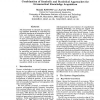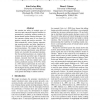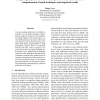444 search results - page 6 / 89 » Representing and Integrating Linguistic Knowledge |
ANLP
1994
13 years 8 months ago
1994
The framework we adopted for customizing linguistic knowledge to individual application domains is an integration of symbolic and statistical approaches. In order to acquire domai...
WEBNET
1996
13 years 8 months ago
1996
Abstract: Alter Egos represent people in Cyberspace. An Alter Ego is a kind of intelligent agent who is active in performing actions in behalf of the person it represents. How thes...
NAACL
2004
13 years 8 months ago
2004
We examine the utility of multiple types of turn-level and contextual linguistic features for automatically predicting student emotions in human-human spoken tutoring dialogues. W...
ACL
2011
12 years 10 months ago
2011
A system making optimal use of available information in incremental language comprehension might be expected to use linguistic knowledge together with current input to revise beli...
COLING
2002
13 years 6 months ago
2002
In this paper we propose an integrated knowledge management system in which terminology-based knowledge acquisition, knowledge integration, and XML-based knowledge retrieval are c...



